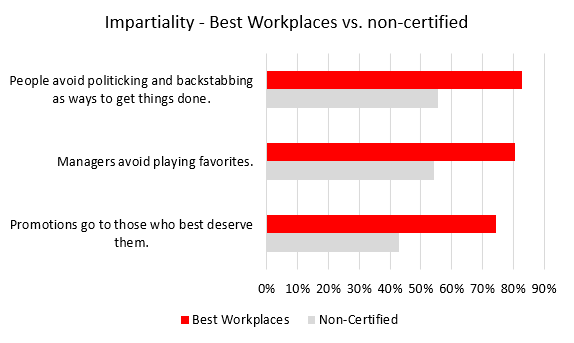Setting the scene
Fairness, one of the five pillars on which our Trust Index survey is build, measures the extent to which employees feel that management practices are fair by assessing the equity, impartiality, and justice employees perceive in the workplace. An important topic the survey focuses on when it comes to measuring fairness, is 'Impartiality'. By using 3 statements, we map employees' perceptions of favouritism, fair promotion opportunities and political games in the workplace.
At Great Place To Work, we survey numerous organisations, of various sizes in various industries. One notable finding is that the statements measuring the impartiality of organisations often receive the lowest scores across many of these companies. Statements on this topic consistently score at the bottom of the ladder. Impartiality seems to be a challenging topic that organisations struggle with, demonstrating the need to explore this issue further.
As an organisation, it is important to engage on this topic, given the fact that a sense of political unfairness fosters feelings of distrust, division, reduced productivity, and less cooperation. Recognising and solving these concerns is critical to building a positive and healthy work environment!

Figure 1. Difference between the Trust Index scores of Best Workplaces 2023 and non-certified organisations 2023 on the Impartiality domain.
In this blogpost, we reflect on some practical steps and different approaches to address this problem and to create an environment where fairness and inclusiveness are prioritised.
Some insights on reducing political unfairness
By implementing the following strategies, organisations can foster a more inclusive and fair work environment, reducing favouritism and promoting equality among employees.
1. Document Feedback and Performance Evaluation:
Maintain a record of employees' performance, accomplishments, and areas for improvement. Provide constructive feedback to individuals regularly, based on specific examples and observations. Having documented evidence of your fair and objective evaluations can help counter perceptions of favouritism.
2. Establish Clear Policies and Procedures:
Encourage a culture where promotions, evaluations and resource allocation are based on performance rather than personal relationships or politics. Ensure that these policies are consistently followed and that employees understand the criteria and processes involved. This helps create a sense of fairness and reduces the perception of favouritism or subjective decision-making.
3. Build Strong, Professional Relationships:
Building a reputation as a team player can help counter any perception of political backstabbing. Develop positive relationships with your colleagues, supervisors, and stakeholders. Building trust can help you navigate challenging situations and resolve conflicts in a constructive manner. Uphold high standards of professionalism in all your interactions. Be mindful of developing close personal relationships with a select few employees, as this can create the perception of favouritism, as those outside the networks feel excluded or disadvantaged.
4. Encourage Employee Engagement:
Actively involve employees in decision-making processes and encourage their participation in shaping the organisation's direction. Seek their input on important matters, provide opportunities for them to contribute ideas and suggestions, and recognize and reward their contributions. Engaged employees who feel valued and involved are less likely to perceive politics in a negative light. This helps foster a sense of ownership and reduces the likelihood of political behaviour arising from feelings of exclusion or powerlessness.
5. Employee Development:
In highly competitive environments or when resources are limited, the perception of favouritism may be more pronounced. Employees may believe that only those with special connections are rewarded with the scarce resources and opportunities. Implement fair and transparent systems for employee development and career advancement. Ensure that these opportunities are accessible to all employees based on their skills, potential, and performance, rather than subjective factors.
6. Communicate Transparently:
Clearly communicate the rationale behind your decisions and actions. Explain the factors considered and the objective criteria used in decision-making processes. This helps to eliminate misconceptions and reduces ambiguity and confusion. And it helps employees understand that your choices are based on merit rather than favouritism.
7. Maintain Integrity:
Uphold strong ethical principles and demonstrate integrity in your actions. Avoid engaging in gossip, spreading rumours, or participating in unethical behaviour that could contribute to organisational politics. Lead by example and adhere to the organisation's values and code of conduct.
Conclusion
The Trust Index survey highlights the importance of impartiality as a challenge for today’s organisations. Organisations must prioritize eliminating politicking to foster trust, engagement, and overall organisational success. By investing in fairness, organisations can create an environment where every individual feels valued, respected, and motivated to contribute their best. This may take time and continuous effort, but the benefits in terms of employee satisfaction and productivity are well worth it!
Next step(s)
Convinced of the importance of measuring and developing organisational fairness? Are you motivated to act towards creating a fair and inclusive work environment? Feel free to subscribe for one of our free info sessions and discover how we can support you.
You may also like
Diverse and Inclusive teams are the engines of Innovation
Company culture is the #1 criterion for choosing an employer
Sources:
Knight, R. (2017, July 27). How Managers Can Avoid Playing Favorites. Harvard Business Review.
Yang, I., Horak, S., & Kakabadse, N. K. (2020). An integrative ethical approach to leader favoritism. Business Ethics, the Environment and Responsibility, 30(1), 90–101.
Indeed Editorial Team. (2023). What Is Favoritism in the Workplace? Definition and Examples. Indeed.com. https://www.indeed.com/career-advice/career-development/favoritism-in-the-workplace

